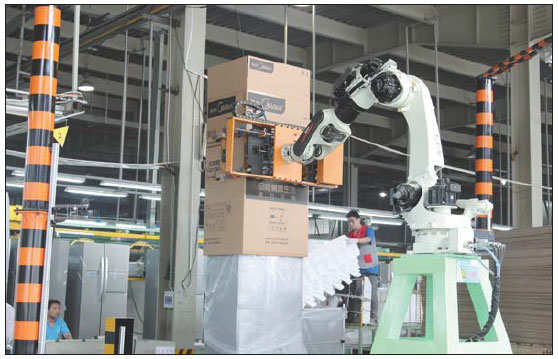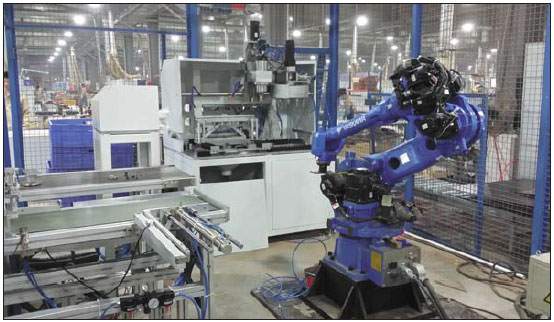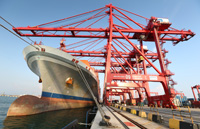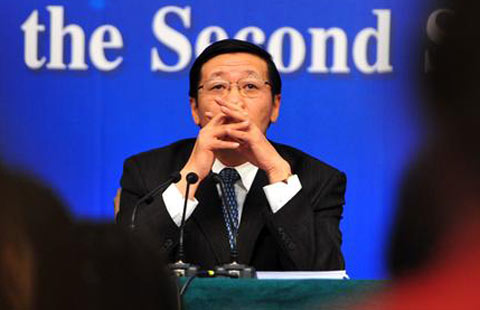Retooling for modern production
By Zhan Lisheng (China Daily) Updated: 2015-03-10 09:30Maritime initiative and technology converge in Foshan
Before it was a modern industrial boomtown, Foshan was a dynamic part in the ancient Maritime Silk Road. Today it has a new plan to make its role even more brilliant in China's new initiative to build the 21st-century version of the trade route.
The Pearl River Delta city in South China's Guangdong province is restructuring its industries to catch the new wave of industrial revolution in smart manufacturing using such technological concepts as Internet of Things and the Internet of Services.
"Having long been a major manufacturing city in Guangdong, or even for the entire nation, the city will continue to highlight the manufacturing industry in its planning for economic growth," said Zhou Zhitong, chief of the city's bureau of commerce.
"The city will upgrade its traditional industries through technological renovation, application of information technology and new types of manufacturing while gearing up efforts to secure investment in smart manufacturing and modern services," he said.
Zhou said traditional industries that have been prioritized for upgrade range from household appliances, porcelain and building materials to textiles and garments, metal processing, food and beverages and furniture.
Smart industries that city highlights include manufacturing equipment for engineering, automobiles, energy saving and environmental protection, new energy, rail transport, satellites and related applications, the Internet of Things, cloud computing, big data, 3D printing, as well as integrated circuits and key components.
Zhou said the equipment manufacturing industry is expected to produce more than 1 trillion yuan ($159.9 billion) worth of products in 2020.
The sector produced more than 400 billion yuan in products in 2014, about one-fourth of the city's gross industrial output value, official statistics indicate.
Local authorities are also encouraging the development of modern services in industrial design, logistics, e-commerce, industrial software development, supply chain finance and technological support, all expected to help boost smart manufacturing.
"We encourage local manufacturers to innovate their production and operation modes so our manufacturing becomes smarter," Zhou said.
"And pleasingly, a growing number of enterprises involved in traditional manufacturing have already taken action."
The official cited the local Midea Group and Wision Furniture Manufacturing Co Ltd as example of companies that incorporate the Internet and other information technologies into traditional manufacturing.
As part of its so-called "M-Smart" strategy, Midea Group, one of China's leading home appliance suppliers, recently partnered with Beijing-based Xiaomi Inc, a maker of popular smartphones. The two firms will join in developing smart household appliances and mobile Internet business.
Prior to this, Midea forged partnerships with the nation's e-commerce giants Alibaba Group and JD.com to further tap its sales potential.
Foshan Wision Furniture Manufacturing Co Ltd, is keeping abreast of the industrial revolution by using new information and production technologies to innovate its manufacturing process and reform its business model.
According to He Yubing, an executive of Wision, technologies such as big data and cloud computing have made it possible for the company to digitalize its production and make its operations more efficient.
zhanlisheng@chinadaily.com.cn
|
A traditional manufacturing hub in South China, Foshan expects to play a big role in the 21st Century Maritime Silk Road initiative.Photos Provided To China Daily |
|
Automated production at a packaging plant of Midea Group. |
|
Robots are used by Wision Co for the manufacturing of furniture. |
(China Daily 03/10/2015 page15)
- Xi and Li point way for Northeast
- Optimism seen for organ donations
- Office to guide protection of tigers
- Working holiday craze grows bigger
- Chengdu attractive to international businesses
- Beijing's slogan banners out of step, scholar says
- Official calls remarks by Dalai Lama 'blasphemy'
- Outdated laws must be replaced, say experts
- Rule of law finds public backing
- Graft crackdown set to continue and intensify










